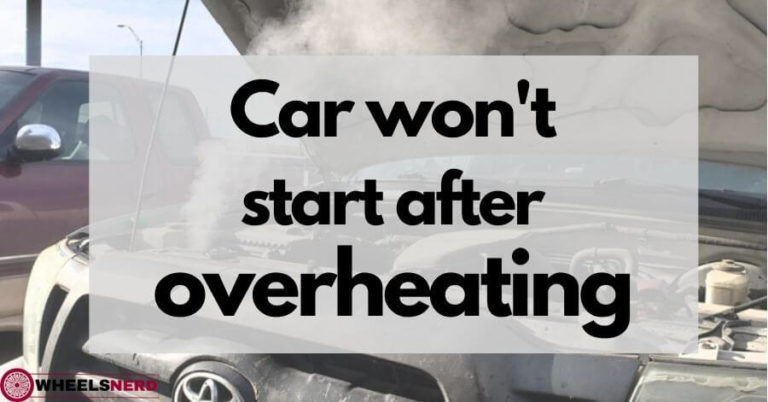Why your car won’t start after overheating?
Well, the main problem here isn’t the car not starting, but the overheating of the engine, and we have to make sure it cools down and does not heat next time. Car engines heat up due to many reasons. Usually, something is wrong inside the cooling system, and the heat cannot escape the engine area.
A leaking cooling system, a malfunctioning radiator fan, a broken water pump, or a closed cooling pipe could be the root of the problem. A heated engine is not something you want in any circumstance. Your engine might inflict considerable, if not permanent, damage.
You want to pay attention to a hot engine, no matter the situation. Here we will tell you about solutions to car overheating problems.
Symptoms of Engine Heating
You can lessen the danger of irreparable engine damage if you can cool your engine before it gets too hot and fails. First, be aware of the signs and symptoms of overheating, which include:
- Smoke emerges under the automobile door.
- Your dashboard’s engine temperature gauge changes to “H” or crimson.
- Check your owner’s manual for specific engine temperature gauge indicators.
- From the engine area, a weird odor rises.
- A leaking cooler, for example, can have a pleasant odor, whereas a leaking oil can have an unpleasant odor.

What to Do if the Engine Overheats?
Below are the tips on cooling the engine before your car gets to a state where it does not start. First, turn off the air conditioner and lower the heat. Doing this right away will relieve the strain on the engine. Turn off the engine and pull over to the side of the street.
Wait for the Engine to Cool Down
If your car is not starting, allow at least 15 minutes for the engine to cool. Keep an eye on the temperature gauge as the engine cools down. It really should return to its normal range.
At the same time, you are waiting and keeping an eye on the meter, putting the system together so you can test your overheated engine. For help, call a friend, a truck, or Firestone Roadside Assistance in your area.
Examine the Coolant Quantity
Examine your coolant quantity, and if you find a low coolant level, filling it right away can save your vehicle engine by preventing it from overheating until the issue is solved. However, this step will help if the cooling pipe is closed or the source of your concerns is a broken radiator fan or water pump.
Check your manual to find the location of your cool water tank and learn how to add a fantastic coolant to your car. If you notice steam, pull over right away. If the engine is producing steam, it is most likely overheating due to coolant problems. Although the vapor may not rise in clouds, if you detect any indications of smoke, pull over immediately.
Do Not Continue Driving (Even if the Car Starts)
If your engine overheats but still works, you should never try to drive your car. You may be able to get to your destination before the vehicle entirely malfunctions, but you could cause severe, costly damage by pushing your engine too far. The safest option is waiting and getting it towed to a garage for repairs.
Do Not Open the Hood Right Away
Once you are out of the car, wait for the engine to cool down before removing the lid to check things. Opening the top too quickly can put you at risk of burns or damage from exposure to steam or smoke.
Patience is the key. Wait until the engine temperature stabilizes before opening the hood. Do not allow the matter. A hot engine will not heal naturally, even if it looks fixed after adding a modest cooler.
Here is a comprehensive video on how you can fix an overheating engine.
How to Protect the Engine from Heating Up?
The best way to prevent overheating of a car engine is to have a regular cooling switch and swap made on your car and keep up-to-date with the adjustment of the radiator.
Regular inspections can also help you correct potential radiator or engine problems before they worsen. Keep calm and head to your nearest Firestone Complete Auto Care for the most reliable national car repair advice and service you need.
Here is an excellent video on preventing the car from heating up.
Reasons for the Engine not Starting After Overheating

Some car issues are unavoidable even if you take all precautions against engine overheating. Do not panic when you wait for your engine to cool and your car does not start. Instead, check for the below underlying issues so you can report them to your mechanic.
- The overheating resulted in a blown gasket, preventing your engine from starting.
- The excess engine heat melted some necessary wires or belts that aided your car wheels in turning.
- A damaged fuel system resulted in leaks and fumes. It means the overheating and the engine malfunction had the exact cause.
- The heat damaged your car battery.
- Engine grease usually evaporates at high temperatures, and your engine will only start with enough grease.
You should always leave such a severe problem to an experienced professional. But if you can diagnose the issue beforehand, it will make the repair smoother, and you will have your car back sooner.
Conclusion
It is worrying if you notice your car overheating and then refusing to start. But do not fret. There are multiple solutions for this, and it is always best to get your vehicle checked by a mechanic. They can safely inspect the issues in your car and stop the overheating problems, allowing your engine to work again.
Also Read: Shifter moves but does not change gears (here is why)

